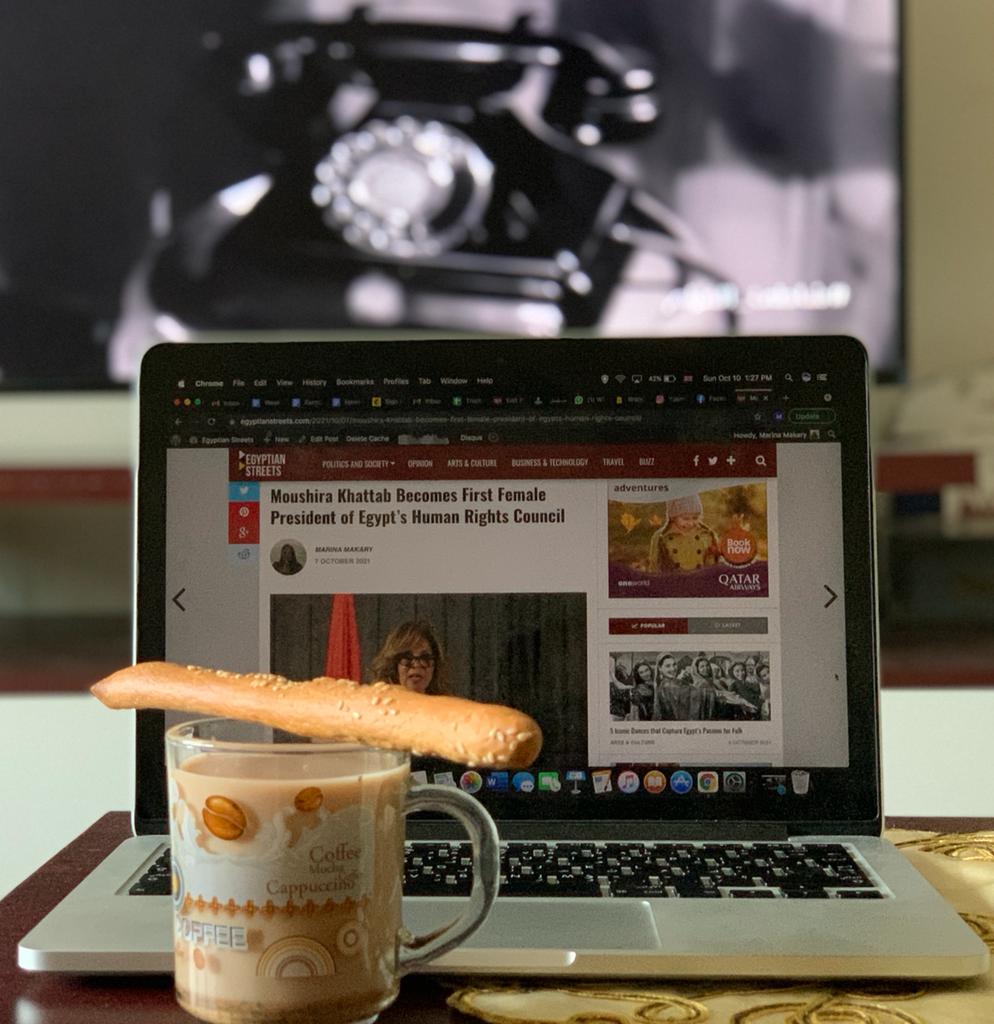My alarm wakes me up five minutes before I’m supposed to log on to my work desktop application. I instantly open my eyes, pull my laptop towards me, and open it, the bright screen temporarily blinding me while signaling the start of a new work day. No lights switched on, no curtains open, just me half-sitting in my bed staring at my laptop screen.
With the months passing by, I began to realize that it’s become almost impossible for me to leave the house in the morning, and in the evening, I would avoid most social gatherings. I became quieter, lazier, and began suffering from an irregular sleep schedule, among other complaints.
Since 10 October marks World Mental Health Day, Egyptian Streets decided to shed light on an issue that affects millions of lives, especially since the start of the COVID-19 pandemic: working from home.
Speaking to Egyptian Streets, Yasmin Abdel Razek, a registered psychotherapist and a marriage and family therapist, explains that working from home has taken a significant toll on people’s mental health over the past months.
“Work/life boundaries have become an increasing concern as many struggle to maintain a balance: high demands of employees’ time and energy, expectation of working extra hours with fewer breaks seeing that they are at the comfort of their homes and don’t have to commute, and having less or no time to interact with coworkers or unwind and connect at home with family,” Yasmin says.
“This can have a direct impact on mental health,” she adds, stressing that isolation, loneliness, frustration, sadness, anxiety over workload or expectations, and burnout, are just a few of the emotions that people go through as a result.
A few days ago, I asked Egyptian Streets’ audience on Instagram how working from home affected their mental health. Although there were a few who had pleasant responses such as, “I like the time I spend with my wife”, the majority echoed going through a hard time, feeling despondent, and suffering from a deteriorating mental state.
View this post on Instagram
How did working from home affect your mental health?
Enas El Masry, 30, Storyteller/Journalist/Content Creator
I quit a job within a month of lockdown in March 2020 because of lacking boundaries. Even before lockdown, I was really struggling with their negligence of mental health. But then it got worse with the lockdown.
Leaving the office was a clear cue for everyone that this is where our paths part until tomorrow – a piece of information that seemed to get lost in this new situation. Both my manager and the CEO were workaholics who had no respect whatsoever for people’s personal lives and need for rest. There were no boundaries and I would constantly get requests for tasks that weren’t urgent as late as 10PM.
Reema Amr, 21, Research Executive
As much as I enjoy not dealing with traffic everyday, I miss the social life and energy.
Maia Sadek, 18, Family Engagement Associate & Translator
Turned me anti-social. I used to consider myself such a social butterfly. Had friends here and there, many connections, knew people everywhere, was always making new friends and just interacting with others any chance that I got. Until my office got transferred from being a room full of people, to a desk in my bedroom.
I got so used to everything being done from home, to the extent where now everything that requires socializing just seems weird or abnormal to me. Any sort of communication with others, or physical interaction, just seems so abnormal! It’s not normal anymore. I lost so many friends to the fact that I never wanted to go out anymore. Everyone took it personally, and thought I don’t want to be with them when in reality, I just can’t comprehend the idea of being around lots of people.
Cara, 23, Online Marketing Manager
I’ve become way more anxious. I think mainly because my whole day happened in my one room apartment. My comfort zone tended to shrink down to my flat. It got way easier since the lockdown ended and my social life came back, but I really have to look out for myself to go outside at least once a day for more than grocery shopping.
What can we do?
For many of us, working from home is continuing with us, even after COVID-19 restrictions have eased. We asked Yasmin for a few tips on ways to make it more productive and less harmful to our mental state.
– Make adjustments accordingly so feelings of loneliness or sadness from the isolation don’t spiral. Being proactive in spending time with family or loved ones, seeing colleagues or setting up meetings on video chats, or even the occasional face to face meet ups (safely and with social distancing precautions in mind) can help reduce the ramifications of social isolation.
– Create a structure for your workday at home, same as you would when you work from an office: shower and get dressed as you would, identify the start and end times of your day, when you will take your break for lunch, and how you will recharge when work ends.
– Define a workspace or “office” for your work: this is ideally a dedicated space solely for work that will allow you to be more focused and free from distractions.
– Commit to a physical exercise routine, whether it’s as simple as a few stretches away from your office chair, a quick walk outside, or a full-hour workout. Daily exercise can alleviate symptoms of depression, sharpen your thinking and judgment, and reduce stress.
– Outside of your working day, it is essential to maintain proper sleep hygiene, healthy eating habits, even during stressful periods.
View this post on Instagram
When should we seek professional help?
Taking care of others is considerate, but taking care of yourself should be a priority in your life. Taking time off to recharge, reconnect with others, or even just to rest, should not be seen as a luxury.
At a certain point, professional help is the only solution, and it is essential to understand that there is absolutely no shame in seeking help when needed. Yasmin highlighted that stress and social isolation “can exacerbate underlying (or develop) mental health conditions”, emotions that many fail to take seriously in their everyday lives.
“If you notice that you are finding it increasingly difficult to work from home, manage the social isolation, set boundaries, or overall function daily as you normally would due to symptoms of anxiety, depression, or other, it is crucial that you consider seeking professional help,” concludes Yasmin, stressing the importance of being mindful to avoid a declining mental health status.
Call 080-8880700 or 0220816831 if you are struggling, to be redirected to your nearest mental health facility.
Subscribe to the Egyptian Streets’ weekly newsletter! Catch up on the latest news, arts & culture headlines, exclusive features and more stories that matter, delivered straight to your inbox by clicking here.






Comment (1)
[…] World Mental Health Day: Egyptians Continue to Struggle With Working From Home […]